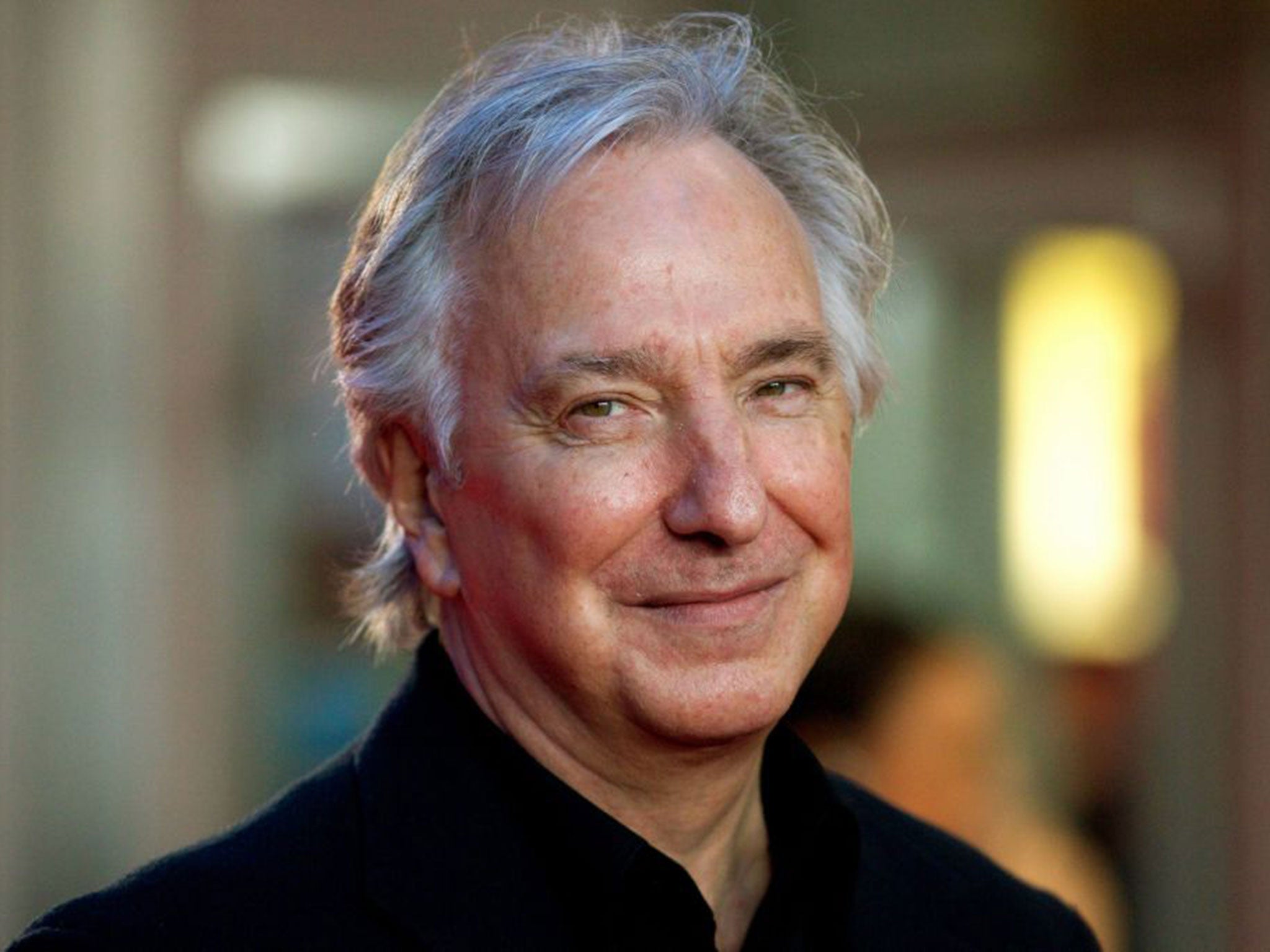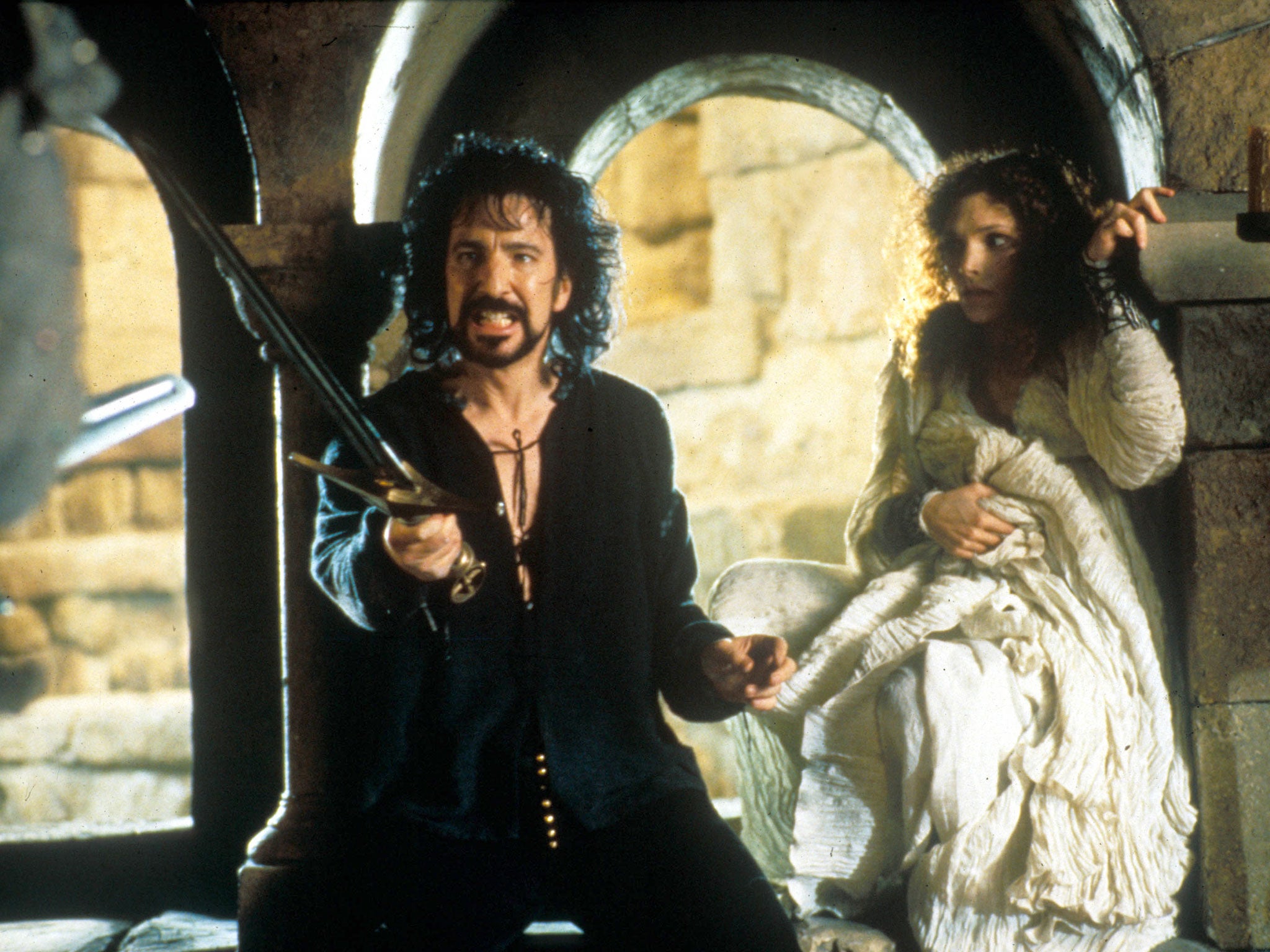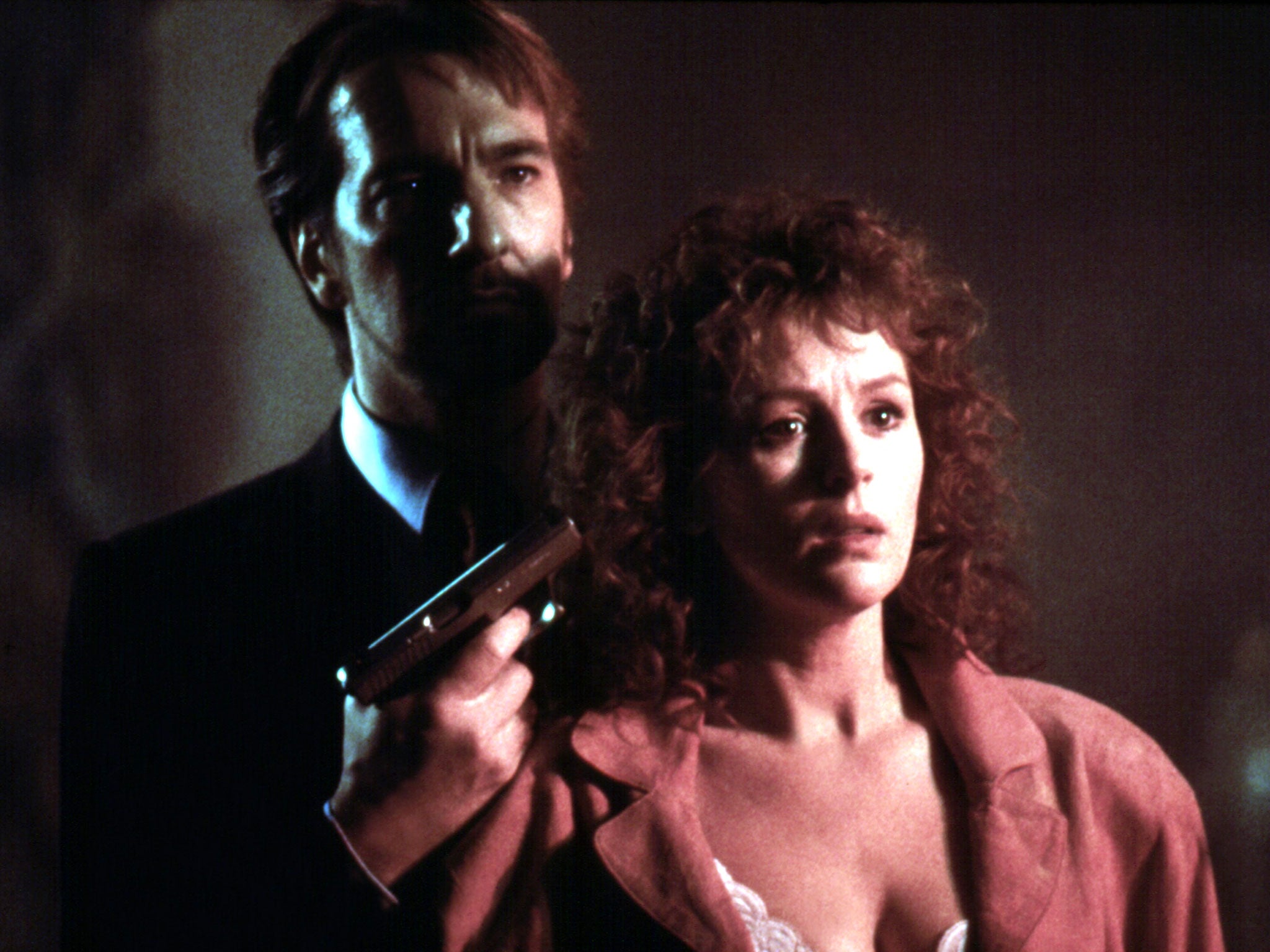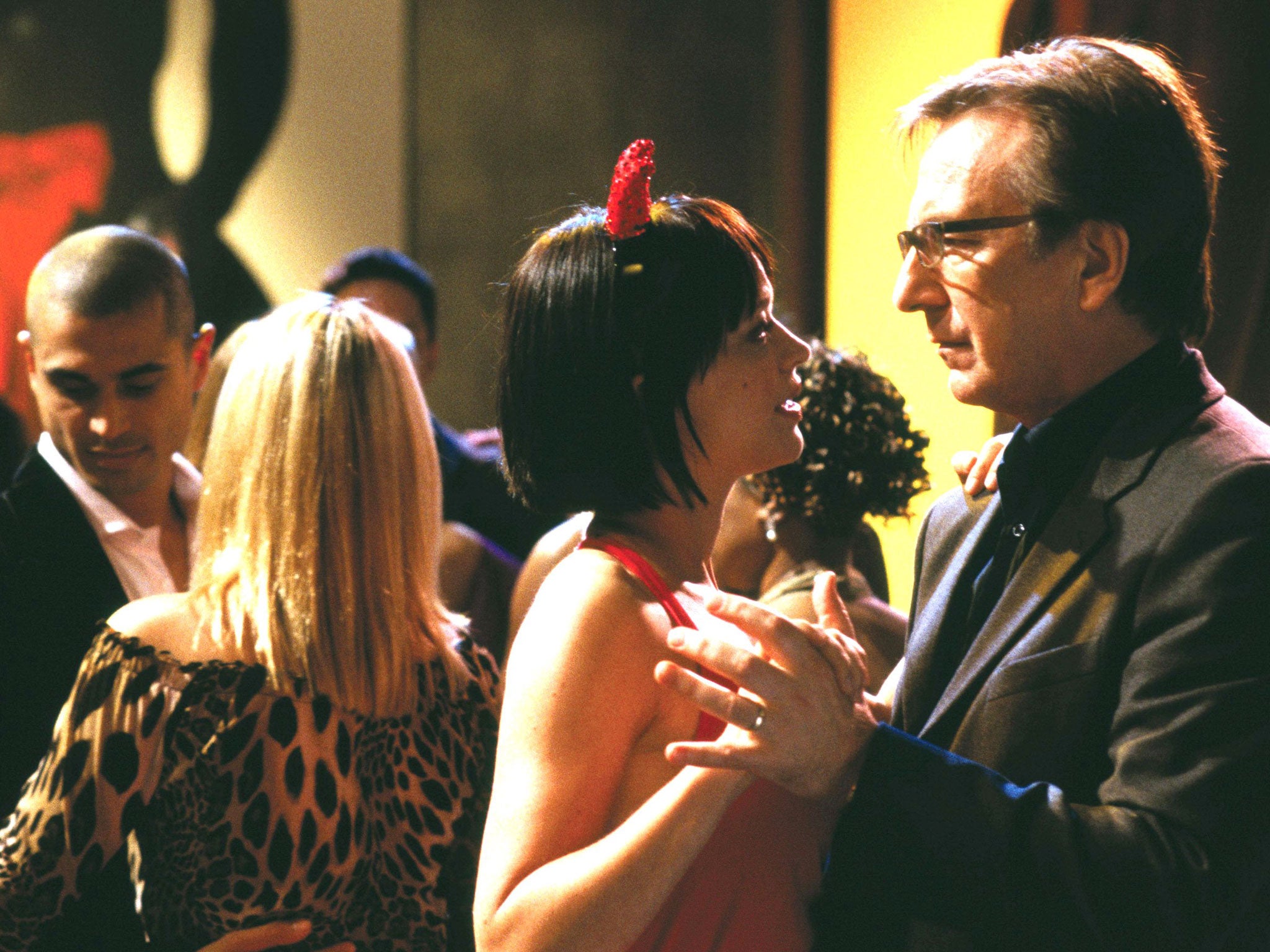Alan Rickman: Actor who was electrifying on stage but became best known as Severus Snape in Harry Potter films
Rickman's raffish good looks, velvety voice and wry warmth made him a box office hit

Your support helps us to tell the story
From reproductive rights to climate change to Big Tech, The Independent is on the ground when the story is developing. Whether it's investigating the financials of Elon Musk's pro-Trump PAC or producing our latest documentary, 'The A Word', which shines a light on the American women fighting for reproductive rights, we know how important it is to parse out the facts from the messaging.
At such a critical moment in US history, we need reporters on the ground. Your donation allows us to keep sending journalists to speak to both sides of the story.
The Independent is trusted by Americans across the entire political spectrum. And unlike many other quality news outlets, we choose not to lock Americans out of our reporting and analysis with paywalls. We believe quality journalism should be available to everyone, paid for by those who can afford it.
Your support makes all the difference.An actor of universal acclaim and universal appeal, the enchanting Alan Rickman had an irresistible blend of skill, care and mischief about him. A late starter and a true all-rounder, he proved to be an actor equally at home in Fringe theatre, period drama or family entertainment; television rather missed out on his gifts, but despite that, wider audiences certainly didn't. Like his contemporary, Bill Nighy (whose career is comparable to Rickman's in so many ways), he spent many years as an actor's actor before coming to fame in middle age, and simultaneously becoming virtually a national treasure.
His raffish good looks, velvety voice and wry warmth, which could just as easily flip into rascalry, made him a box office hit in roles such as an outrageous Sheriff of Nottingham in Robin Hood: Prince of Thieves (1991), the fearsome Severus Snape in the Harry Potter films and the late lamented lover in Anthony Minghella's amorous fantasy Truly, Madly, Deeply (1990).
The son of an Irish factory worker, he was born in 1946 on a council estate in Acton, west London. He first stepped on to a stage at five years old in the nativity play at Derwentwater Junior School; two years later a role in another school play left him bewitched by drama. His father died of lung cancer the following year; his mother would make an unsuccessful attempt to remarry before accepting that she had lost the one love of her life.
He won a scholarship to Latymer Upper School in Hammersmith, where his mellifluous voice was honed (in fact, his voice grew so musical that he found himself typecast in female roles for much of his time there). Latymer proved a glorious playground for the drama-hungry student; the magnanimous theatre critic Robert Cushman, a fellow pupil, described it as being plentifully staffed by frustrated actors, and in later years it added Mel Smith, Hugh Grant and Samantha Bond to its alumni.
Rickman's other great gift, watercolour painting, and his reservations about acting as a career, saw him graduate from Latymer first to Chelsea College of Art and Design (where he met his life partner, Rim Horton), and then to the Royal College of Art. He then worked as a graphic designer for Graphiti, an unsuccessful design company he founded with a group of friends, and then for the short-lived underground radical freesheet newspaper The Notting Hill Herald, before winning a place at Rada at the age of 26.
He supported himself at drama school by working as a dresser for Nigel Hawthorne and Sir Ralph Richardson, and left with several prizes, including the Emile Littler Prize, the Forbes Robertson Prize and the Bancroft Gold Medal. His was an exciting, exacting talent, and it wasn't a secret for long. He worked in rep at Leicester, Birmingham and Sheffield (where he shared a flat with his friend, Ruby Wax). At Birmingham in 1976 he played Sherlock Holmes to David Suchet's Moriarty in a play by William Gillette; the company's production of Ben Johnson's The Devil Is An Ass the same year played on the National's Lyttleton stage.
In 1978 he joined the RSC, but at that point it proved a bad fit for him. His roles there included Ferdinand in The Tempest, Farquharson in Captain Swing and Boyet in Love's Labour's Lost; more exciting was an audition for a new play at the fiery Bush Theatre in Shepherd's Bush in 1980. The play was Commitments, a sterling work depicting left-wing activists during the three day week (and screaming for a revival in these dichotomous times). Sharing with the play's director, Richard Wilson, both an organic approach to acting and a political persuasion, the production felt like coming home for Rickman, who in performance even developed a sly resemblance to the play's writer, Dusty Hughes.

Rickman's own politicism had been awoken when he had watched Peter Barnes' play The Ruling Class in 1968, which he said had changed his life. He also felt a lifelong affinity with Thomas "Clio" Rickman, friend and biographer of Thomas Paine.
He gave life to more new writing in Stephen Poliakoff's police and pop-festival play The Summer Party at the Crucible, Sheffield in 1980, and became a familiar part of the fizzing and crackling London Fringe, frequently playing at the Bush and the Royal Court (then enjoying a period of reaffirmation under Max Stafford-Clark after a series of crises in the late-'70s), in productions like Snoo Wilson's marijuana melange The Glass Widow in 1982. The same year he made a significant television appearance as the shady, unctuous parson Obadiah Slope in The Barchester Chronicles for the BBC, and the wider public woke up to this funny, caddish and fascinating performer.

A return to the RSC in 1985 proved much more fruitful than his experiences there in the late-'70s. He played Jacques in Adrian Noble's As You Like It, Achilles in Troilus and Cressida and, most famously, Vicomte de Valmont in Howard Davies' production of Les Liaisons Dangereuses, part of an electrifying cast that included Lindsay Duncan Lesley Manville and Juliet Stevenson. Nicholas de Jongh in The Guardian wrote, "that drawling voice steeped in languor, and that impassive countenance, slips sly and inscrutable through the action like a cat who knows the way to the cream".
But he was always an assiduous actor; rather than resting on newly found laurels after Robin Hood: Prince of Thieves, during the summer of its success he could be found at the Edinburgh Festival playing in Yukio Ninagawa's unforgettable production of Kunio Shimizu's wistful Tango at the End of Winter.
Like Richard Wilson, Rickman proved to be an intuitive director; at the Royal Court in 2005 he returned to political theatre with My Name Is Rachel Corrie, which he and Katharine Viner compiled from the writings of the American activist killed in Gaza. Ten years earlier he had commissioned Sharman Macdonald to write the ghostly The Winter Guest (1995), which he directed with Ruby Wax. The sparse, hypnotic play ran at the West Yorkshire Playhouse and the Almeida in Islington; a commendably low-key cinema version in 1997 saw Rickman make his debut as a film director. Last year he returned to film directing with A Little Chaos, in which he also starred, as Louis XIV.
Since Robin Hood: Prince of Thieves, a film that was far slighter than Rickman's performance, he had become a screen favourite, appearing in everything from Stephen Poliakoff's intense incest drama Close My Eyes (1991), Neil Jordan's drama about the IRA founder, Michael Collins, (1996) and as the noble Colonel Brandon in Ang Lee's beautiful Sense and Sensibility (1996), to the Harry Potter franchise. "He had a real understanding of the character," said the films' producer, David Heyman. "The shadow that he casts in these films is a huge one and the emotion he conveys is immeasurable."

A role he nearly turned down but which made his name in the US was the chilling villain of the Bruce Willis action thriller Die Hard (1988). He was also one of the best things in Richard Curtis's over-egged Love Actually (2003), and note-perfect as the voices of Marvin the Paranoid Android in The Hitch-Hiker's Guide to the Galaxy (2005) and Absalom the Caterpillar in Tim Burton's Alice in Wonderland (2010).
But even in those glitzy years, theatre didn't lose him altogether: his reunion with Davies and Duncan 16 years on from Les Liaisons Dangereuses for Private Lives (Albery, 2001) was a thing of beauty, breathtaking in its balancing act of deft comedy and emotional damage, and it earned him his second Tony nomination when it transferred to Broadway, as Les Liasons Dangereuses had done.
In 2015 he married Rima Horton, his partner of half a century. Rickman, who died of cancer, was a patron of the charity Saving Faces, which helps those with facial cancers and disfigurements, honorary president of the International Performers Aid Trust, and a vice-chairman of Rada. He was industrious as well as meticulous, and the results across the decades have been superb. Nothing sums up his unique mixture of charm and skill as well as his own mantra: "I do take my work seriously and the way to do that is not to take yourself too seriously".
Alan Sidney Patrick Rickman, actor and director: born London 21 February 1946; married 2015 Rima Horton; died 14 January 2016.
Join our commenting forum
Join thought-provoking conversations, follow other Independent readers and see their replies
Comments